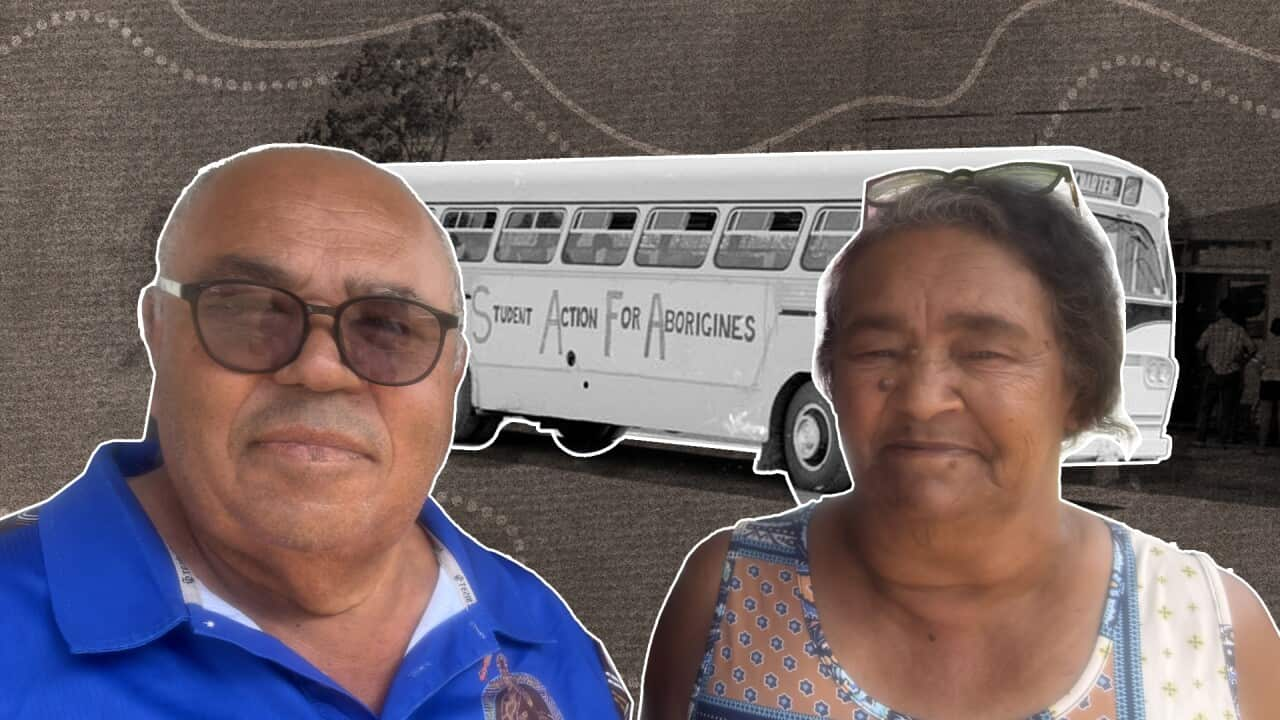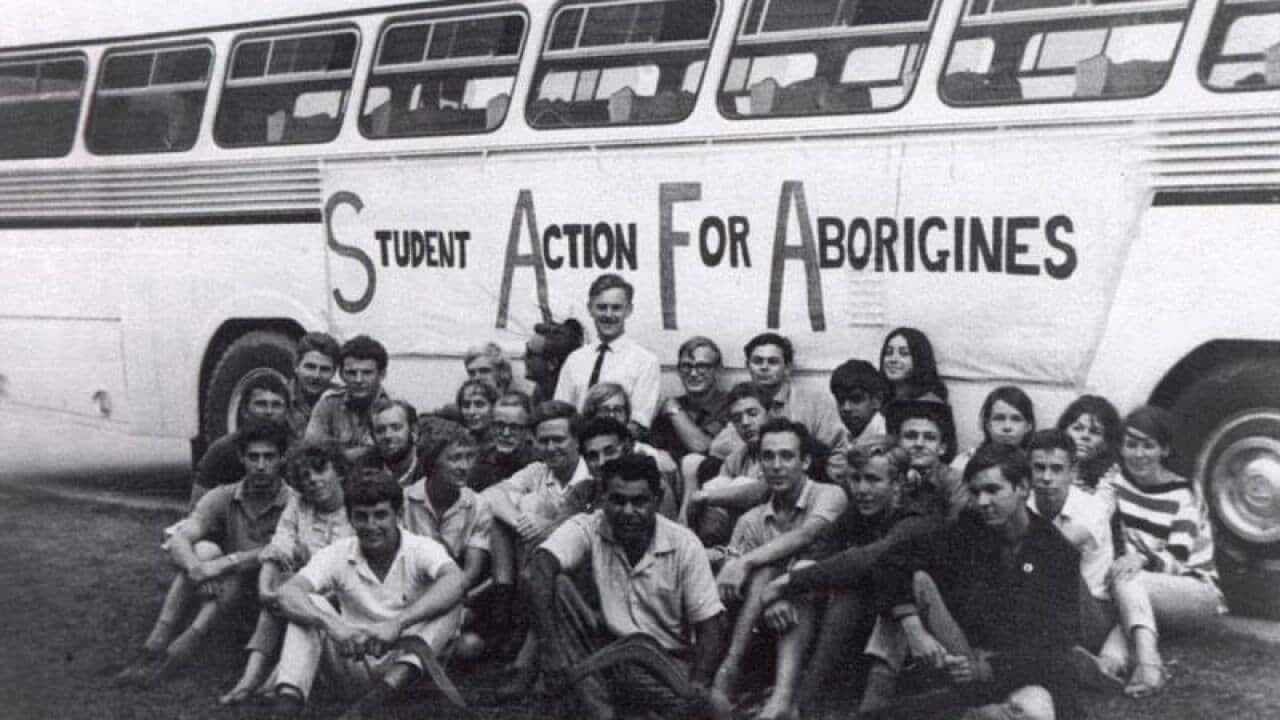It’s the middle of the day and the temperature is pushing 38 degrees in Walgett.
It’s a dry heat here so it feels like we are standing in an oven on the unshaded sidewalk outside the RSL club. Inside, the bar is a cool, dark sanctuary for those who sit escaping the blazing sun.
The bartender expertly pulls a beer with the right amount of froth and quickly carries it with steady hands across the floor where he serves Kamilaroi man Barry 'Beau' Thorne.
"Thank you brother,” says Thorne.
As he takes a sip of the beer, he loudly declares, “Thank God for the Freedom Ride!”
Everyone in the RSL erupts with laughter. There’s only a few people in the RSL but almost everyone here is mob, a far cry from 60 years ago when their forebears were banned from coming inside the Walgett RSL.
The RSL, now a place of welcome, will also host local Freedom Ride celebrations in honour of the 60th anniversary of the event.
Risk and sacrifice for change
Walgett is a small country town, home to about 2000 people, that’s an eight-hour drive from Sydney.
Heat shimmers above the melting bitumen of the straight, empty highway that is occasionally filled by a road train, grey nomad camper van or a family of emus.
In 1965 a group of university students from Sydney travelled this highway on their Freedom Ride.

The 1965 route of the Freedom Ride, touring regional NSW to protest racial discrimination and segregation.
Local Harry Hall helped organise the Walgett visit. His daughter Mary, a Yuwaalaraay Gamilaroi woman who was ten years old when the Freedom Ride came through, says it cost her father his job.
“He was working for the Department of Main Roads at the time," she told NITV.
"They thought he was loudmouth and very political and all that, but he wasn't. We were just trying to make changes for the Aboriginal people.
"We weren't allowed to go into the picture show upstairs. We wasn't allowed to go and try dresses on when we were at one of the frock shops in Walgett. And then we only came as far as the corner, and we couldn't come any further up the street ...
"But then the Freedom Ride Students come along, and they were there, and they made a big impact.”
'I don’t think Walgett had seen anything like that before'
Nowhere was this impact felt more keenly than in the local Returned And Services League (RSL).
RSL Clubs can be found in towns across Australia, a place where returned and active servicemen and women can have a meal and come together and honour those who have served Australia.
In 1965, Aboriginal people in Walgett were not allowed inside the RSL. This meant that men who had risked their lives fighting for Australia were not allowed inside to have a beer with the white men they had stood beside during war.
Gamilaroi woman Jenny Trindall was eight when the Freedom Riders came to Walgett.
Her own great uncle, a veteran, told her of the racism he faced from the RSL, banned after returning from war.
“To see the big change, now we've got an influx of Aboriginal staff, is really great for the town, for visitors to ... see Aboriginal staff behind the bar where they weren't allowed in there back in the day to go and have a beer.”

Garry and Jenny Trindall. Jenny's great uncle was a war veteran who was refused service in Walgett's RSL.
Ann Curthoys, now a History Professor at Sydney University, was one of those students, waving placards like 'Acceptance, Not Segregation', 'End Colour Bar', 'Bullets did not Discriminate', 'Walgett - Australia's Disgrace', 'Why Whites Only' and 'Educate the Whites'.
“It was very, very hot," says Professor Curthoys.
"I’ve got to mention that first because it was February, summer, Walgett.
"So, we all lined up and protested with our placards and I don’t think Walgett had seen anything much like that before.”
A counterprotest against the Freedom Riders swelled. There was shouting and arguments; Professor Curthoys remembers Charlie Perkins giving an impressive speech about equality.
Later that night, the Reverend at the church hall where they were staying told them he objected to their protesting and they would have to leave, so at 9pm the students got on their bus and left Walgett.
A violent confrontation grabs attention
They drove North East towards Moree in the dark but they were not alone.
Professor Curthoys looks calm as she tells a scary story.
“As we were driving we were followed by a whole lot of cars with lights on, and you couldn’t tell if they were hostile or friendly cars.
"What I know now is they were mainly friendly, but one of them was hostile and that came and tried to side swipe the bus and drive it off the road.
"That was dangerous because it was on a very high road, there was a big ditch on both sides of the carriageway. The driver had to really negotiate to stop the bus from rolling over."
A cadet reporter from the Sydney Morning Herald happened to be on board the bus during the incident, a chance circumstance that led to growing awareness of the Ride.
"He reported it and the combination of having a media report, a dangerous event a big issue came together, and publicity broke out from that point onwards.”
A world apart
Inside the Walgett RSL Beau Thorne is drinking his beer, reflecting on The Freedom Ride.
“I was 13 when they were protesting out the front of here and it was ballistic. It was pretty wild. No Aboriginal men or women could come in here.
"That changed obviously and now the club wouldn’t survive without Aboriginal people. That is a fact of this town.”
Today a Freedom Ride Memorial Park has been built opposite the RSL.
It contains photos of the historic event and includes a picture of Mary, wearing a dress, with her family.
Mary smiles as she tells us of another dress, one she wanted to buy for her 21st birthday party.
"I actually was able to go into that shop, the same shop that we wasn't allowed to try the dresses on, and try that dress on and buy it.
"That was the change that I felt. Now when I look around, it's all opened up, the clubs and everything."

Mary with the dress she was able to buy thanks to the efforts of the Freedom Riders.
He recalls segregation at some local pubs like the Imperial Hotel remaining in Walgett for decades after the Freedom Riders left.
“When I joined the police in ‘88, the front bar was only for Aboriginal people and the back bar was for the white fellas.
"So, you know the Freedom Ride was there, it was recognised, but there was still a lot of barriers to break down and we're still trying to break down those barriers today.”
Nonetheless, Mary Purse smiles as she reflects on the changes in Walgett since the Freedom Ride.
"There's still a little bit of racism there, but I think Walgett has improved a lot," she says.
"If Charlie was alive now to walk in the RSL club and he'd see all the Aboriginal people behind the bar and supervisors too, he'd been over the moon.
"He wouldn't have believed it. Same as my dad, he wouldn't have believed it.”






